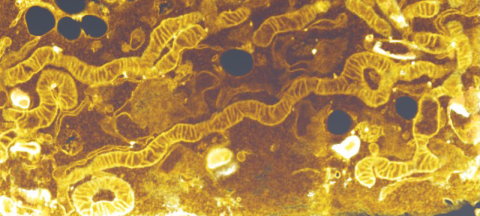Mitochondria drive cell survival in times of need

Discovery points to possible target for cancer drugs
McGill University researchers have discovered a mechanism through which mitochondria, the energy factory of our body’s cells, play a role in preventing cells from dying when the cells are deprived of nutrients – a finding that points to a potential target for next-generation cancer drugs.
The research, published in Molecular Cell, builds on previous work by McGill professor Nahum Sonenberg, one of the senior authors of the new study.
Cells in our body grow in size, mass and numbers through a process governed by a master regulator known as mTOR (Mechanistic Target of Rapamycin). Sonenberg discovered years ago that mTOR also controls protein expression in all human cells. In particular, mTOR targets the selective synthesis of proteins destined for the mitochondria, the bacteria-like structures in all our cells that generate the energy needed for cells to grow and divide.
In collaboration with the research labs of McGill scientists Heidi McBride of the Montreal Neurological Institute and John Bergeron, Sonenberg and his team have now shown that mTOR also controls the expression of proteins that alter the structure and function of mitochondria -- thereby protecting cells from dying.
Their work has implications for cancer therapy, since new drugs that act on mTOR are currently in clinical trials for cancer. While the treatments are effective in arresting the expansion and growth of cancer cells, the cells continue to survive, despite a shortage of nutrients. The new study reveals that mitochondria help keep these cells alive by fusing together and blocking a central point in a cell death pathway, called apoptosis.
This advance offers clues to develop combination therapies that could promote cancer-cell death by reversing the protection offered by mitochondria, the researchers say.
Two postdoctoral fellows from the Sonenberg and McBride labs, Masahiro Morita currently at the University of Texas Health Science Center at San Antonio, and Julien Prudent, currently at MRC Mitochondrial Biology Unit in Cambridge, UK, led the collaborative team, working together to map the details of this cellular survival pathway.
“mTOR Controls Mitochondrial Dynamics and Cell Survival via MTFP1,” Masahiro Morita, Julien Prudent, et al. Molecular Cell, Sept. 21, 2017
DOI: 10.1016/j.molcel.2017.08.013
Funding for the research was provided in part by the Canadian Institutes of Health Research, the Canadian Cancer Society Research Institute, the Terry Fox Research Institute, and the National Sciences and Engineering Research Council of Canada.
Source: McGill University





